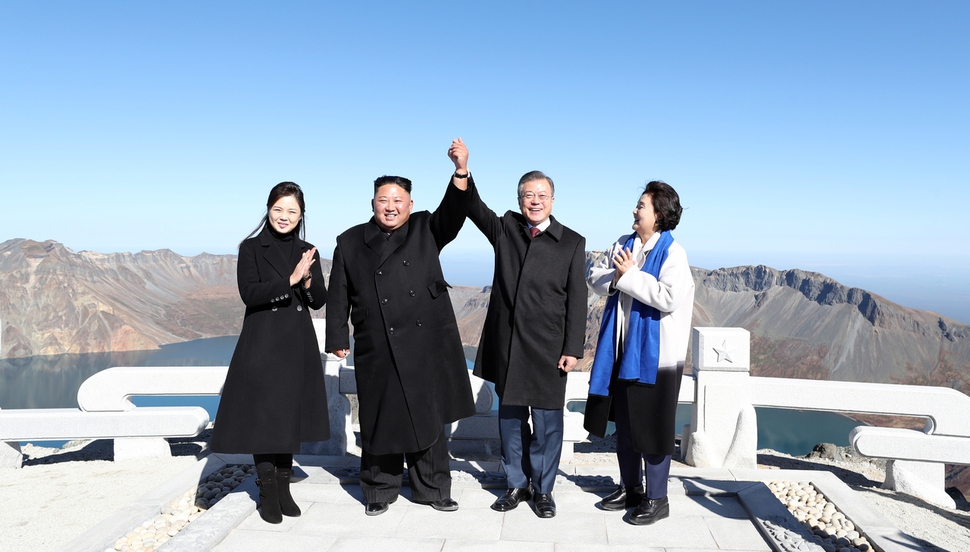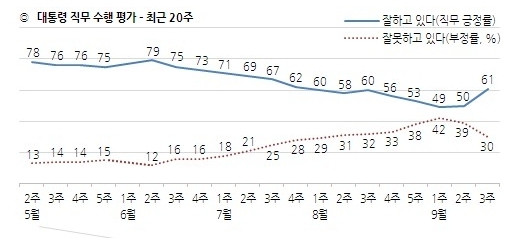Posted on : Sep.23,2018 08:02 KST
 |
|
South Korean President Moon Jae-in and North Korean leader Kim Jong-un pose for a photograph at the top of Mount Baekdu on Sept. 20, the third day of the Pyongyang summit. (photo pool)
|
Gallup survey finds increase of 11 percentage points in approval
A recent inter-Korean summit in Pyongyang appears to have had a strong effect on South Korean President Moon Jae-in’s governance approval rating.
Findings released on Sept. 21 from a Gallup survey of 1,001 adult South Koreans nationwide on Sept. 18–20 (margin of error ±3.1 percentage points with a 95% confidence level) showed 61% of respondents holding favorable opinions of President Moon’s governance performance as of the third week of September. The number was up by 11 percentage points from the week before. Thirty percent held negative opinions, down nine percentage points from the previous week.
By age group, positive opinions were reported by 63% of respondents aged 20–29, 70% of those aged 30–39, 66% of those aged 40–49, 50% of those aged 50–59, and 58% of those 60 and older. Positive ratings rose in terms of respondent characteristics in most cases compared to the week before, with the largest rise witnesses among those aged 60 and over.
The most commonly cited reason for a positive opinion was “improvement in relations with North Korea” (26%), followed by “the inter-Korean summit” (14%), “North Korea/security policies” (12%), “strong diplomatic performance” (8%), and “commitment to doing his best” (5%).
 |
|
A depiction of Moon’s approval ratings for the past 20 weeks. The solid line depicts approval while the dotted line depicts disapproval. (Source: Gallup Korea)
|
Negative perceptions still related to economy
In the case of negative ratings, respondents cited “failure to adequately resolve economic and livelihood issues” (44%), “relations with North Korea and pro-North Korean attitudes” (14%), “the minimum wage hike” (7%), and “real estate policies” (4%), as well as Moon’s “dogmatic, unilateral, and partisan approach.”
“The rise in positive views of the president’s performance this week can be seen as reflecting the effect of the third inter-Korean summit in Pyongyang, which took place during the polling period,” Gallup said.
“The percentage of responses related to North Korea among reasons for positive assessment was up substantially, and ‘relations with North Korea and pro-North Korean attitudes’ were the second most often cited reason for negative assessments after economic and livelihood issues,” it added.
The Democratic Party had the highest support rating among political parties at 46% (up by six percentage points), followed by the Liberal Korea Party at 13% (up by two), the Justice Party at 10% (down by two), the Bareunmirae Party at 4% (down by four), and the Party for Democracy and Peace at 1%. Twenty-five percent of respondents stated no party preference.
When asked whether they believed North Korea would uphold its agreements at the inter-Korean summit on denuclearization, a Korean War-ending declaration, and adoption of a peace agreement, 49% of respondents agreed, while 35% predicted it would not and 15% did not state an opinion.
The results showed a decline of nine percentage points in optimistic predictions about North Korea’s fulfillment of the agreement terms and a 15 percentage point rise in pessimistic views compared to previous findings taken shortly after the first inter-Korean summit at Panmunjom on Apr. 27.
“This appears to reflect awareness of the abrupt changes in North Korea’s attitude as seen with its denunciation of joint South Korea-US aerial exercises and postponement of high-level talks in mid-May, along with practical difficulties such as the turbulence in North Korea-US relations since their summit in June,” Gallup said.
By Lee Kyung-mi, staff reporter
Please direct comments or questions to [english@hani.co.kr]










